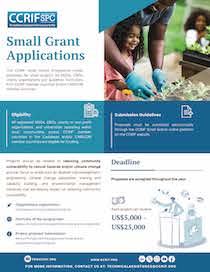A magnitude 5.3 earthquake occurred at 18:24:34 UTC on 7 October 2020, 56 km (34.8 mi) ESE of Road Town, British Virgin Islands; 78.1 km (48.5 mi) NE of Saint Croix, U.S. Virgin Islands and 81.7 km (50.8 mi) ESE of Charlotte Amalie, U.S. Virgin Islands. Estimates from the United States Geological Survey (USGS) located the epicentre of the event at 18.174°N, 64.178°W, and at a depth of 10.0 km (6.2 mi). The British Virgin Islands was the CCRIF member country closest to the epicentre.
Tropical Cyclone Delta was the twenty-sixth tropical cyclone and the ninth hurricane in the 2020 Atlantic Hurricane Season. On 5 October, it was upgraded from a tropical depression to a tropical storm while it was over the central Caribbean Sea, south of Jamaica. On 6 October, Tropical Storm Delta rapidly strengthened, becoming a category 4 hurricane at its closest proximity to the Cayman Islands (approximately 115 mi, 185 km, from Grand Cayman). Tropical-storm-force winds from extended over this country.
Dominica was under the influence of two tropical waves resulting in adverse weather conditions that occurred between September 29 and October 3, 2020. During this period, parts of Dominica were affected by showers and isolated thunderstorms.
This event briefing describes the impact of the rainfall on Dominica, which is associated with a Covered Area Rainfall Event (CARE), starting on 29 September and ending on 3 October 2020.
Tropical Cyclone Nana was the sixteenth tropical cyclone and the fifth hurricane in the 2020 Atlantic Hurricane Season. On 1 September, it was upgraded from a tropical depression to a tropical storm while it was over the central Caribbean Sea, south of Jamaica. On 3 September, Tropical Storm Nana strengthened, becoming a category 1 hurricane, just before making landfall on the coast of Belize, spreading hurricane-force winds over this country.
The interaction of a tropical wave, a broad area of low pressure and an upper level low pressure area produced periods of showers and thunderstorm activity over the southeastern Caribbean Sea, Trinidad and Tobago and the surrounding areas between August 30 and 31, 2020. Tobago was affected by persistent and intense rainfall between 0800UTC and 1700UTC on 31 August.
The Government of Trinidad and Tobago has two separate Excess Rainfall policies – one for Trinidad and one for Tobago.
The interaction of a tropical wave, a broad area low pressure and an upper level low pressure produced periods of showers and thunderstorm activity over the south-eastern Caribbean Sea, Trinidad and Tobago and the surrounding areas between August 30 and 31, 2020. Grenada was affected by intense rainfall on 31 August from 0730UTC to 1130UTC.
This event briefing describes the impact of rainfall on Grenada, which was associated with a Covered Area Rainfall Event (CARE), starting on 31 August and ending on 2 September 2020.
A magnitude 6.0 earthquake occurred at 21:51:09 UTC on 24 August 2020, 4.5 km (2.8 mi) S of Jacó, Costa Rica; 50.1 km (31.2 mi) SSE of Puntarenas, Costa Rica and 172.5 km (107.2 mi) SSE of San Carlos, Nicaragua. Estimates from the United States Geological Survey (USGS) located the epicentre of the event at 9.575°N, 84.631°W, and at a depth of 19.4 km (12 mi) – Figure 1. Nicaragua was the only CCRIF member country where peak ground acceleration, computed with the CCRIF SPHERA model, was greater than 0.01 g for this earthquake.
Nicaragua was under the influence of low pressure systems on the coast of the Pacific Ocean, namely Tropical Wave Thirty and Tropical Depression Fourteen, resulting in adverse weather conditions that occurred between August 21 and 24, 2020. During this period, Nicaragua was affected by heavy rains.
Haiti was under the influence of Tropical Storm Laura during on 23 August resulting in adverse weather conditions, primarily heavy rainfall that occurred between 23 and 25 August, 2020, mainly over the southern portion of the country but including other sections as well.
This event briefing describes the impact of rainfall on Haiti, which was associated with a Covered Area Rainfall Event (CARE), starting on 23 August and ending on 25 August 2020.
Tropical Cyclone Laura was the thirteenth tropical cyclone in the 2020 Atlantic Hurricane Season and the earliest twelfth named storm on record in the North Atlantic basin. On 21 August it was upgraded from a tropical depression to a tropical storm while it was over the tropical Atlantic, just to the east of the northern Leeward Islands. After the passage over the northern Leeward Islands, Tropical Storm Laura headed for the island of Hispaniola. On 23 August, its centre passed over Haiti, spreading tropical-storm-force winds over the country.





